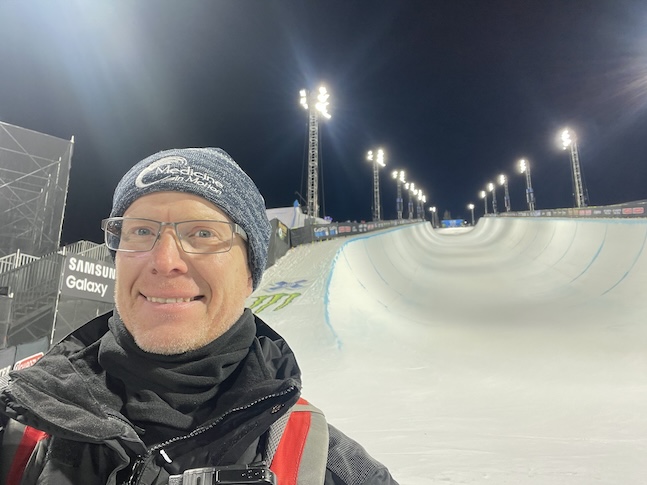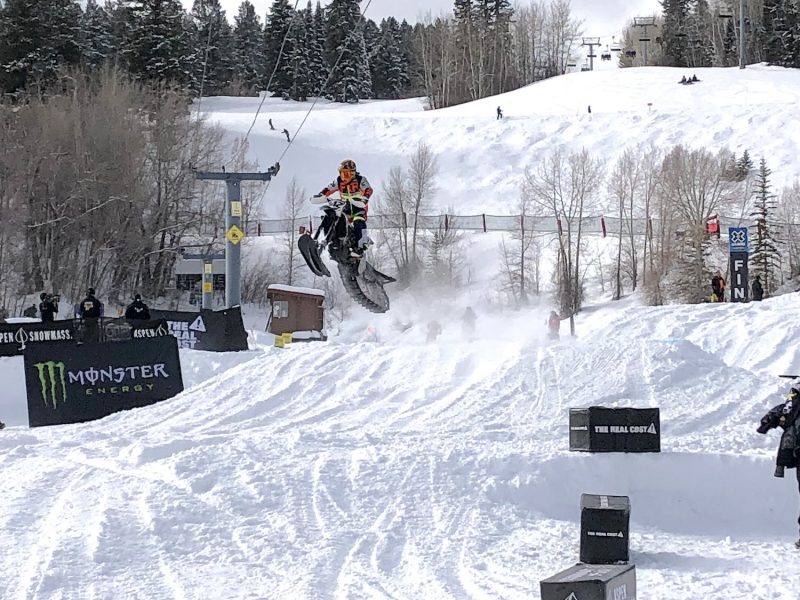Delivering extreme care, from the lab to the slopes
Treating extreme athletes demands extreme expertise. Luckily, Ian McLeod has that in spades.
When he’s not teaching future physician assistants at NAU’s Phoenix Bioscience Core, McLeod is often in the field using his medical expertise to treat, train, and rehabilitate some of the biggest names in professional sports—including world-champion skiers and snowboarders.
At the end of January, McLeod spent a few days in Aspen, Colorado, serving as an on-course medical responder at the Winter X Games. It’s his ninth year working at the event, which brings together extreme athletes from across the globe for ski and snowboarding competitions in slopestyle, halfpipe, snowmobiling, and more.

“It’s very different from teaching full time,” McLeod said with a laugh. “At NAU, my day typically consists of giving lectures, helping out with lab activities, meeting with students, and guiding them through their studies. At the X Games, I commute to work on a snowmobile loaded with medical supplies, and my coworkers are medical professionals on skis and some of the best athletes in the world.”
McLeod first landed the job in 2011 after being contacted by Clay Selby, a friend from physician assistant school who had co-founded the company Medicine in Motion with Robb Blackaby. Medicine in Motion, which brings together providers across several disciplines to offer unparalleled care to athletes and entertainers, is contracted to provide medical coverage services for every winter and summer X Games event.
While in previous years McLeod covered events like snowmobile freestyle—“that was scary to watch,” he admitted—he served this year as the medical lead for the slopestyle course, which challenges skiers and snowboarders with rails, jumps, and other obstacles as they race downhill.
“If someone on the course appeared to be injured, it was my role to respond and triage,” McLeod said. “I assessed whether they’re conscious, whether they’re able to continue competing, and whether they need transport to the base of the mountain for further treatment.”

That sounds like a daunting and demanding task—but McLeod said it’s made less so by the legions of support staff both on and off the course. In addition to McLeod, four other medical providers were stationed throughout the slopestyle course, and they stayed in constant communication throughout the competition. Whenever it came time to transport an athlete to the base of the mountain, McLeod and his colleagues had help from a group of medical providers on skis, an ambulance staffed by emergency medical professionals, and a team of physicians and physical therapists stationed inside two converted rooms at the nearby ski resort.
McLeod said he often uses his experiences at the X Games to build case studies in his clinical medicine and diagnostic medicine classes.
“When I teach the musculoskeletal unit, I incorporate examples of the real injuries I’ve seen,” he said. “Working at the X Games has taught me so much about how to respond to injuries in cold weather and how to stay calm in the worst-case scenario, and I want to pass on those valuable lessons to my students.”

In addition to teaching at NAU and working with Medicine in Motion, McLeod is a guest lecturer at A.T. Still University and a primary care physician for the Arizona Diamondbacks, where he conducts preseason physicals and provides coverage for a handful of home games each month during the regular season.
Amid all that chaos, McLeod also sets aside time for mountain biking, his biggest passion. The lifelong athlete is currently training for the Breck Epic Mountain Bike Stage Race in August—plus, he’s helping to coordinate medical coverage for the Arizona Interscholastic Cycling League, a series of races for middle school and high school students throughout the state.
It’s no wonder, then, that McLeod looks forward to the Winter X Games every year: He understands extreme athletes’ extreme dedication.
“What I think draws people to extreme sports—what drew me to mountain biking—is the drive to push your own limits,” McLeod said. “While I’m not doing things as extreme as the X Games athletes are, I’m pushing the envelope, too, and I’ve had crashes, too. But the love of the sport always drives me back.”
As seen on The NAU Review.
